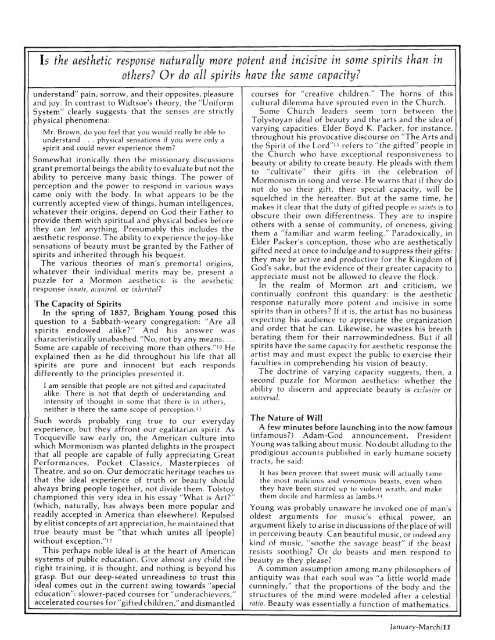from the editors - Sunstone Magazine
from the editors - Sunstone Magazine
from the editors - Sunstone Magazine
You also want an ePaper? Increase the reach of your titles
YUMPU automatically turns print PDFs into web optimized ePapers that Google loves.
Is <strong>the</strong> aes<strong>the</strong>tic response naturally more potent and incisive in some spirits than in<br />
o<strong>the</strong>rs? Or do all spirits have <strong>the</strong> same capacity?<br />
understand" pain, sorrow, and <strong>the</strong>ir opposites, pleasure<br />
and joy. In contrast to Widtsoe’s <strong>the</strong>ory, <strong>the</strong> "Uniform<br />
System" clearly suggests that <strong>the</strong> senses are strictly<br />
physical phenomena:<br />
Mr. Brown, do you feel that you would really be able to<br />
understand . . . physical sensations if you were only a<br />
spirit and could never experience <strong>the</strong>m?<br />
Somewhat ironically <strong>the</strong>n <strong>the</strong> missionary discussions<br />
grant premortal beings <strong>the</strong> ability to evaluate but not <strong>the</strong><br />
ability to perceive many basic things. The power of<br />
perception and <strong>the</strong> power to respond in various ways<br />
came only with <strong>the</strong> body. In what appears to be <strong>the</strong><br />
currently accepted view of things, human intelligences,<br />
whatever <strong>the</strong>ir origins, depend on God <strong>the</strong>ir Fa<strong>the</strong>r to<br />
provide <strong>the</strong>m with spiritual and physical bodies before<br />
<strong>the</strong>y can feel anything. Presumably this includes <strong>the</strong><br />
aes<strong>the</strong>tic response. The ability to experience <strong>the</strong> joy-like<br />
sensations of beauty must be granted by <strong>the</strong> Fa<strong>the</strong>r of<br />
spirits and inherited through his bequest.<br />
The various <strong>the</strong>ories of man’s premortal origins,<br />
whatever <strong>the</strong>ir individual merits may be, present a<br />
puzzle for a Mormon aes<strong>the</strong>tics: is <strong>the</strong> aes<strong>the</strong>tic<br />
response innate, acquired, or inherited?<br />
The Capacity of Spirits<br />
In <strong>the</strong> spring of 1857, Brigham Young posed this<br />
question to a Sabbath-weary congregation: "Are all<br />
spirits endowed alike?" And his answer was<br />
characteristically unabashed. "No, not by any means ....<br />
Some are capable of receiving more than o<strong>the</strong>rs."~0 He<br />
explained <strong>the</strong>n as he did throughout his life that all<br />
spirits are pure and innocent but each responds<br />
differently to <strong>the</strong> principles presented it.<br />
I am sensible that people are not gifted and capacitated<br />
alike. There is not that depth of understanding and<br />
intensity of thought in some that <strong>the</strong>re is in o<strong>the</strong>rs,<br />
nei<strong>the</strong>r is <strong>the</strong>re <strong>the</strong> same scope of perception. 11<br />
Such words probably ring true to our everyday<br />
experience, but <strong>the</strong>y affront our egalitarian spirit. As<br />
Tocqueville saw early on, <strong>the</strong> American culture into<br />
which Mormonism was planted delights in <strong>the</strong> prospect<br />
that all people are capable of fully appreciating Great<br />
Performances, Pocket Classics, Masterpieces of<br />
Theatre, and so on. Our democratic heritage teaches us<br />
that <strong>the</strong> ideal experience of truth or beauty should<br />
always bring people toge<strong>the</strong>r, not divide <strong>the</strong>m. Tolstoy<br />
championed this very idea in his essay "What is Art?"<br />
(which, naturally, has always been more popular and<br />
readily accepted in America than elsewhere). Repulsed<br />
by elitist concepts of art appreciation, he maintained that<br />
true beauty must be "that which unites all [people]<br />
without exception."12<br />
This perhaps noble ideal is at <strong>the</strong> heart of American<br />
systems of public education. Give almost any child <strong>the</strong><br />
right training, it is thought, and nothing is beyond his<br />
grasp. But our deep-seated unreadiness to trust this<br />
ideal comes out in <strong>the</strong> current swing towards "special<br />
education": slower-paced courses for "underachievers,"<br />
accelerated courses for "gifted children," and dismantled<br />
courses for "creative children." The horns of this<br />
cultural dilemma have sprouted even in <strong>the</strong> Church.<br />
Some Church leaders seem torn between <strong>the</strong><br />
Tolystoyan ideal of beauty and <strong>the</strong> arts and <strong>the</strong> idea of<br />
varying capacities. Elder Boyd K. Packer, for instance,<br />
throughout his provocative discourse on "The Arts and<br />
<strong>the</strong> Spirit of <strong>the</strong> Lord ’’~3 refers to "<strong>the</strong> gifted" people in<br />
<strong>the</strong> Church who have exceptional responsiveness to<br />
beauty or ability to create beauty. He pleads with <strong>the</strong>m<br />
to "cultivate" <strong>the</strong>ir gifts in <strong>the</strong> celebration of<br />
Mormonism in song and verse. He warns that if <strong>the</strong>y do<br />
not do so <strong>the</strong>ir gift, <strong>the</strong>ir special capacity, will be<br />
squelched in <strong>the</strong> hereafter. But at <strong>the</strong> same time, he<br />
makes it clear that <strong>the</strong> duty of gifted people as saints is to<br />
obscure <strong>the</strong>ir own differentness. They are to inspire<br />
o<strong>the</strong>rs with a sense of community, of oneness, giving<br />
<strong>the</strong>m a "familiar and warm feeling." Paradoxically, in<br />
Elder Packer’s conception, those who are aes<strong>the</strong>tically<br />
gifted need at once to indulge and to suppress <strong>the</strong>ir gifts:<br />
<strong>the</strong>y may be active and productive for <strong>the</strong> Kingdom of<br />
God’s sake, but <strong>the</strong> evidence of <strong>the</strong>ir greater capacity to<br />
appreciate must not be allowed to cleave <strong>the</strong> flock.<br />
In <strong>the</strong> realm of Mormon art and criticism, we<br />
continually confront this quandary: is <strong>the</strong> aes<strong>the</strong>tic<br />
response naturally more potent and incisive in some<br />
spirits than in o<strong>the</strong>rs? If it is, <strong>the</strong> artist has no business<br />
expecting his audience to appreciate <strong>the</strong> organization<br />
and order that he can. Likewise, he wastes his breath<br />
berating <strong>the</strong>m for <strong>the</strong>ir narrowmindedness. But if all<br />
spirits have <strong>the</strong> same capacity for aes<strong>the</strong>tic response <strong>the</strong><br />
artist may and must expect <strong>the</strong> public to exercise <strong>the</strong>ir<br />
faculties in comprehending his vision of beauty.<br />
The doctrine of varying capacity suggests, <strong>the</strong>n, a<br />
second puzzle for Mormon aes<strong>the</strong>tics: whe<strong>the</strong>r <strong>the</strong><br />
ability to discern and appreciate beauty is exclusive or<br />
universal.<br />
The Nature of Will<br />
A few minutes before launching into <strong>the</strong> now famous<br />
(infamous?) Adam-God announcement, President<br />
Young was talking about music. No doubt alluding to <strong>the</strong><br />
prodigious accounts published in early humane society<br />
tracts, he said:<br />
It has been proven that sweet music will actually tame<br />
<strong>the</strong> most malicious and venomous beasts, even when<br />
<strong>the</strong>y have been stirred up to violent wrath, and make<br />
<strong>the</strong>m docile and harmless as lambs.~4<br />
Young was probably unaware he invoked one of man’s<br />
oldest arguments for music’s ethical power, an<br />
argument likely to arise in discussions of <strong>the</strong> place of will<br />
in perceiving beauty. Can beautiful music, or indeed any<br />
kind of music, "soo<strong>the</strong> <strong>the</strong> savage beast" if <strong>the</strong> beast<br />
resists soothing? Or do beasts and men respond to<br />
beauty as <strong>the</strong>y please?<br />
A common assumption among many philosophers of<br />
antiquity was that each soul was "a little world made<br />
cunningly," that <strong>the</strong> proportions of <strong>the</strong> body and <strong>the</strong><br />
structures of <strong>the</strong> mind were modeled after a celestial<br />
ratio. Beauty was essentially a function of ma<strong>the</strong>matics.<br />
January-Marchi11

















